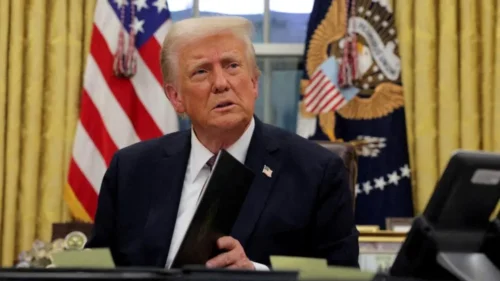A federal judge in Seattle has provisionally halted Donald Trump’s bid to abolish birthright citizenship in the United States.
During a 25-minute hearing on Thursday, US District Court Judge John Coughenour ruled that Trump’s executive order is “clearly unconstitutional” and issued a restraining order to prohibit its enforcement.
Nearly everyone born in the United States automatically receives citizenship, according to a well-established interpretation of the 14th Amendment of the Constitution.
Trump aspires to eliminate the rule that applies to children born to parents who are either temporarily or illegally in the country.
Washington, Arizona, Illinois, and Oregon requested that the order be suspended while the federal court evaluates their legal challenge.
Judge Coughenour criticized a lawyer from the Trump administration during the arguments, challenging the assertion that the executive order was constitutional and asking, “Where were the lawyers” while it was being drafted?
The judge’s response was, “It is beyond my comprehension.”
The executive order will be suspended for 14 days in anticipation of additional legal proceedings.
Judge’s Questioning of Trump Administration’s Legal Arguments
Trump, who assumed the presidency of the United States on Monday, has consistently expressed his intention to implement this modification.
His executive order directed US government departments and agencies to refuse citizenship to the children of migrants who are either in the United States illegally or on transitory visas.
The case’s Department of Justice (DoJ) legal filings indicate that it would have applied to infants born on 19 February and thereafter.
According to reports, the administration intended to enforce the order by withholding documents, including passports, from individuals deemed ineligible for citizenship.

The judge’s order also temporarily suspended federal agencies’ enforcement of the order.
The four states involved in the lawsuit argue that the 14th Amendment and U.S. law automatically grant citizenship to those born in the United States and assert that the president does not have the power to alter the Constitution in this case.
The residents of those states will “suffer immediately,” they further state, and they will suffer irreparable harm if the order is implemented.
“The individuals who are stripped of their United States citizenship will be rendered undocumented, subject to removal or detention, and many will be stateless,” according to the lawsuit.
Trump’s Department of Justice contended that the states’ case did not necessitate the “extraordinary measure” of a temporary restraining order; however, the judge disagreed.
Ratified in 1868, the 14th Amendment states that “All persons born or naturalized in the United States, and subject to its jurisdiction, are citizens of the United States.”
The Department of Justice argued that the clause “and subject to their jurisdiction thereof” unlawfully excludes non-citizen children in the United States. It also claimed that the order is “a crucial component” of Trump’s goal to address the “ongoing crisis at the southern border” and the nation’s “broken immigration system.”
According to the state’s legal challenge, 255,000 infants were born to undocumented mothers in the United States in 2022.
Courts have interpreted the amendment as granting citizenship to individuals born on US territory, with limited exceptions, such as the offspring of foreign diplomats.
Experts agree that the courts will likely settle this matter unless a direct amendment to the US Constitution occurs, requiring a two-thirds majority in both Congress and state approval.
The attorneys for the federal government announced their intention to appeal the ruling, expecting that the case would eventually reach the United States Supreme Court.
In the aftermath of the United States Civil War, the birthright citizenship amendment was enacted to resolve the issue of the citizenship of former slaves who were born in the United States and were emancipated.
Lane Polozola, counsel for the state of Washington, argued in court that Trump’s directive would lead the country back to “one of our… darkest chapters.”
Judge Coughenour, who temporarily suspended the executive order, has been employed by the Western District of Washington court since 1981, following his appointment by Republican President Ronald Reagan.
A distinct challenge to the executive order has been filed by the District of Columbia, the city of San Francisco, and 18 other Democratic-led states.
The American Civil Liberties Union (ACLU) also contests Trump’s order in court.

Salman Ahmad is known for his significant contributions to esteemed publications like the Times of India and the Express Tribune. Salman has carved a niche as a freelance journalist, combining thorough research with engaging reporting.














